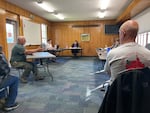
Grant Darrow, left, speaks to the Union County Board of Commissioners in this October 2022 file photo, as Mike McCarter, right, listens at Union County offices in La Grande, Ore.
Antonio Sierra / OPB
The group Citizens for Greater Idaho were on track this week to pull out a narrow victory in Wallowa County as a part of its multiyear effort to move a large swath of rural Oregon to a different state. But the organized political opposition to the concept is also becoming more visible.
Since 2020, Greater Idaho has placed ballot measures in counties across the state asking voters to support the concept of moving Idaho’s borders closer to the Cascade Mountains so that rural Oregonians can be represented by the conservative Idaho state government. Wallowa County was one of the first to vote against the idea, but a second referendum put to voters this week held a 7-vote lead as of Saturday morning.
In a press release claiming victory, Greater Idaho offered its own explanation for the tight margin.
“Wallowa County only has two percent of the population of eastern Oregon, and its beautiful mountain views draw an unusually large percentage of upper-income residents from the Willamette Valley, who may have been less supportive of joining Idaho,” the press release states. “Another reason Wallowa County may have been less sure than other counties about the movement ... is that Portland Democrats outspent them in Wallowa County to level false accusations.”
Western States Strategies, the political arm of Portland nonprofit Western States Center, did get involved in opposing the ballot measure in the last weeks of the campaign. Still, one Wallowa County resident said the opposition was much broader than a single organization.
Rob Klavins said he moved to Wallowa County with his wife 10 years ago, attracted by the county’s natural beauty. He and his wife both work for environmental nonprofits and run a bed and breakfast near Enterprise.
While Klavins’ progressive politics put him in the minority in conservative Wallowa County, he said the opposition movement to Greater Idaho grew organically and across the political spectrum.
“I think we’re looking to our leaders to do what’s best for us across the state,” he said. “We’re not interested in these political games that are pitting us against each other, and I don’t think we want to turn our backs on one another.”
Conversations between community members turned into action, Klavins said. By the time the Western States started sending out mailers and running online ads in the closing weeks of the campaign, Klavins said Wallowa County residents had already been receiving pro-Greater Idaho campaign material for weeks. Some local residents had begun organizing events and activities to oppose the ballot measure.

FILE: La Pine, Ore., resident Mike McCarter on Feb. 19, 2020. McCarter, part of the separatist group Citizens for a Greater Idaho, said rural counties are "outraged by liberal policies from the Oregon Legislature that threaten their livelihoods, industries and values."
Emily Cureton / OPB
Although the Greater Idaho ballot measure is poised to pass, Klavins said the fact that the vote came down to a nearly 50-50 split in a county where Republicans usually win by landslide margins shows that anti-Greater Idaho voters came from a variety of political backgrounds.
Western States felt compelled to make a late entry into the campaign as part of its mission to oppose far-right politics in the Northwest.
Western States Center has been studying and pushing back against far-right groups for years, but it only recently got involved in the Greater Idaho campaign through Western States Strategies.
Western States chief of staff Jill Garvey said the organization is concerned about Greater Idaho because of the history of the region’s secessionist movements. Garvey said previous movements to create new states from conservative parts of the inland Northwest have had ties to paramilitary and white nationalist figures.
Garvey sees Greater Idaho’s goal as consolidating power at a time when vulnerable groups like LGBTQ people are under threat.
“What we’re doing is just pulling back the curtain,” she said. “Nothing else. These are how these organizations are connected. We’re naming what we believe their real goals are.”
Greater Idaho has long denied associations to white nationalism or right-wing extremism, though Idaho has a well-documented history of hate groups like the Aryan Nations, Patriot Front and various neo-nazi affiliates. In a response to Western States’ campaign material, Greater Idaho offered up its own definition of a “white separatist.”
“Real white separatists move to another place to get away from people of color in their area,” a press release states. “We are doing the opposite. We don’t want to move. We want to extend red-state governance over the area where we live. This won’t change the racial balance where we live.”
Turning to legislatures
Wallowa County and other counties that have considered a Greater Idaho-sponsored ballot measure aren’t voting directly on moving state lines. Most ballot measures ask voters if they would like their county commissioners to hold regular meetings to discuss the prospect of moving state borders.
Should this week’s results hold, Wallowa would become the 12th county to approve a pro-Greater Idaho ballot measure. The group’s vision originally included southwestern Oregon, but they redrew their proposed lines after Douglas and Josephine counties voted against ballot measures.
Greater Idaho officials said they are working toward putting up a ballot measure in Crook County, but there aren’t many counties left to vote on the issue. Regardless, the power to change state lines lies with both state legislatures and Congress.
Garvey said the stakes are high even if these ballot measures don’t move any legislators in Salem.
“Even if they are unlikely to actually redraw their borders if they build political power in the region, and they believe that they are doing it on the strength of their white nationalist ideology, that’s problematic for most of the people who live there,” she said.
Western States’ advertisements caused Greater Idaho to file an election complaint with the Oregon Secretary of State’s Office. Greater Idaho accuses Western States of violating state campaign disclosure laws by failing to identify itself as the sponsor in its advertisements. Greater Idaho also heavily ties the ads to Ben Unger, a political consultant and former Democratic state legislator who works with Western States. Unger did not comment on the record of the complaint.
“We are not afraid of opposition,” Greater Idaho spokesman McCaw said before the election results were revealed. “We have an argument that Eastern Oregonians support and 11 counties have voted for, but we do believe very much that people should follow the law.”
Garvey said state law doesn’t require Western States to identify themselves in campaign advertisements for local ballot measures. She said Western States didn’t disclose their identity as a way to prevent threats and harassment to their staff.
The run of successful ballot measures will mean little if Greater Idaho can’t convince each state’s legislatures to take action. In Idaho, a state House of Representatives resolution to begin discussions over border movement died in the state Senate. A similar resolution in Oregon put forward by state Sen. Dennis Linthicum, R-Klamath Falls, has not received a hearing, and is unlikely to given the state’s Democratic majority.